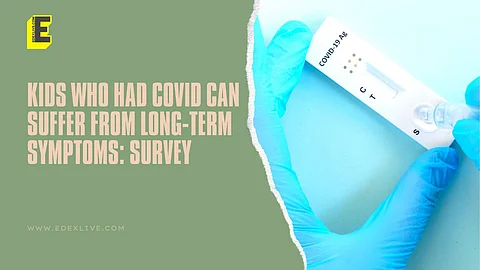

As per a study, children infected by the SARS-CoV-2 virus but not hospitalised can experience long-term COVID symptoms for three months past the infection. Regarding this, a survey was conducted in October 2020 and the research published in The Pediatric Infectious Disease Journal examined data from volunteers between the age of five and 18 across the state of Texas, USA, as stated in a report by PTI.
For the survey, the volunteers were enrolled in the Texas CARES survey with an aim of assessing COVID-19 antibody status over time among a population of adults and children in Texas. Further, the data for the survey was collected before and after the vaccine rollout and also during the waves of Delta and Omicron variants.
The first author of the study and a professor at the University of Texas Health Science Center, Sarah Messiah, said, "We were interested in understanding if children impacted with an acute or severe infection of COVID-19 would go on to have persisting symptoms, or what we call long COVID." Further, “This particular study is unique as the first population-based study in the literature to report on the prevalence of long COVID in children who have not been hospitalised with COVID-19," Messiah said.
Giving more details on this survey, the researchers said that a total of 82 pediatric volunteers (4.8 per cent of the total 1,813) reported having long COVID symptoms. And about 1.5 per cent showed symptoms that lasted between 4 and 12 weeks, including loss of taste and smell, fatigue and cough, they added.
Additionally, the study also found that an additional 3.3 per cent of children reported that symptoms such as loss of taste and smell, cough and difficulty breathing persisted for longer than 12 weeks.
Sharing her views on this, Messiah said, "When we looked at risk factors of those who reported symptoms past 12 weeks, we found that children who were unvaccinated and who had obesity had a higher chance of developing long COVID."
Adding to this, the scientist said, "These findings are consistent with other literature that found children and adults who have comorbid health conditions and are unvaccinated are at a higher risk of being hospitalised for the virus."
Talking about the risk factor, Messiah said, "If you have had COVID-19 earlier in the pandemic, you were more at risk for longer symptoms. With Delta and Omicron, we did see a lot of children who ended up hospitalised, but their symptoms were less severe, and our results show they were also less likely to report persistent symptoms too."
Talking about the importance of this survey, researchers said that this finding is important as it highlights the presence of non-hospitalised youth that may also experience persistent long COVID symptoms after infection.
Further, Messiah said, "There may be a perception that one needs to be hospitalised to have long COVID and that is not what we found." Additionally, "I encourage parents to still take caution and get their child vaccinated against COVID-19 because we now know that it will decrease the risk of infection and long COVID,” she added.
